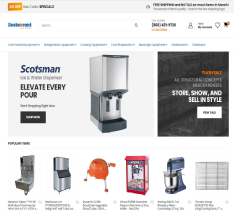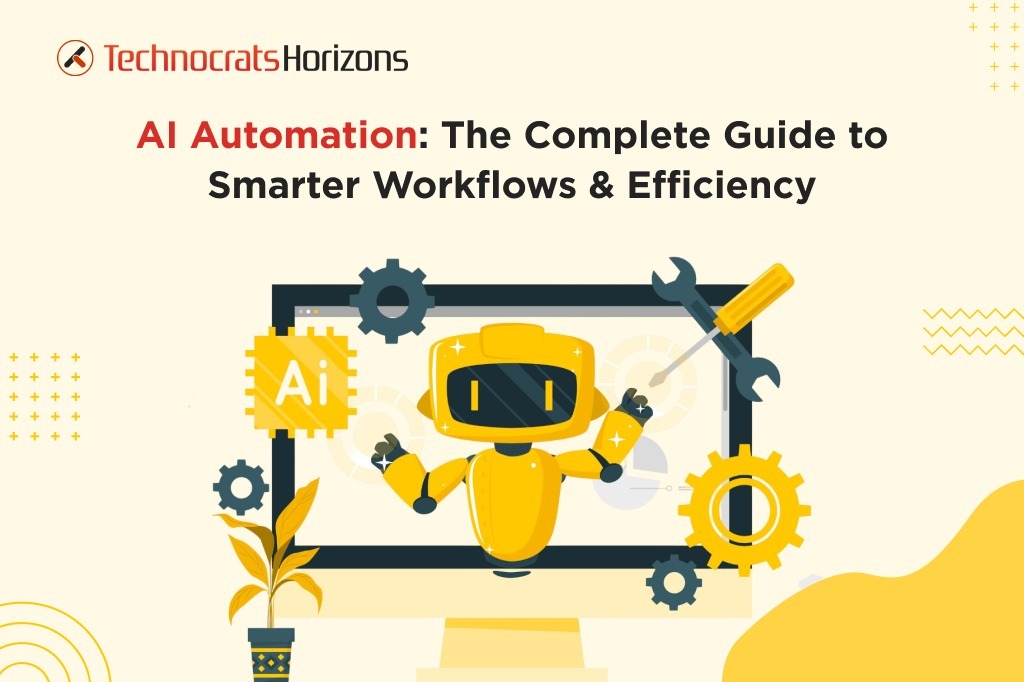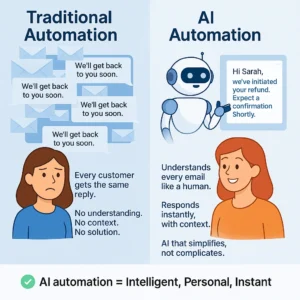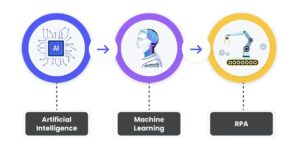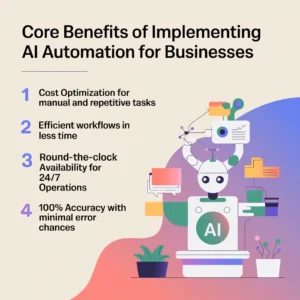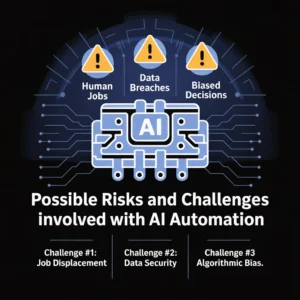“AI automation combines the power of artificial intelligence (AI) with traditional automation methods to streamline repetitive and time-consuming business operations intelligently and eliminate the need for human intervention. The combination of AI and automation ultimately allows businesses to perform operations smartly and efficiently, and also enables teams to focus on high-value work effectively.”
Imagine: You have recently set up an email automation system to respond to customer queries. Every customer email gets an instant reply. However, every email reply states, “We’ll get back to you soon,” regardless of the customer’s email, whether it’s to request a refund or inquire about a product. So, instead of simplifying your email work, the automation system has made it even more complex.
This is what actually happens with traditional automation.
Now picture this:
An AI-powered email automation system that reads every email, understands it just the way we humans do, and replies to every email with a personalized message. And that too instantly.
That’s what AI automation is. ✔️
Automation is not just about performing operations faster. It’s about streamlining operations intelligently without needing human oversight, so we can focus on more intricate business operations effectively.
And this becomes possible through AI business automation. The leading technology involves the blend of powerful AI technology with traditional automation methods to ensure your workflows get completed quickly and precisely without needing any human intervention.
Whether you need to respond to hundreds of emails in a day with personalized replies or generate reports for a particular project, AI automation performs every work operation with human perfection.
Because,
“The automation of tasks through AI is not just about efficiency—it’s about completely rethinking what’s possible.”
— Sundar Pichai, CEO of Google & Alphabet 👔
This guide will today give you a thorough understanding of AI business automation to have smarter workflows and efficiency.
Understanding AI Automation
AI automation, also known as intelligent automation or hyper-automation, is the combination of powerful artificial intelligence with traditional automation techniques to streamline workflows and decision-making processes in a smarter yet more efficient way.
Although we have traditional automation processes, they follow fixed rules or scripts, which makes them limited to only automating repetitive tasks.
AI automation, on the contrary, makes real-time data interpretations, makes informed decisions, and automatically evolves with time.
For instance,
Conventional automation will reply to all your regular emails with a common reply that will say, “We will get back to you soon,” without reading the message.
But an intelligent email assistant embedded with AI automation will read the message, understand it, and reply to it accordingly, instead of sending irrelevant and common replies to every email.
AI Automation Vs Traditional Automation: A Quick Showdown
| Workflow | Traditional Automation | AI Automation |
|---|---|---|
| Customer Support and Service | Rule-based chatbots with common and scripted replies | AI chatbots that understand customer queries first and then respond |
| Email Handling | Sends fixed auto-responses irrelevant of the email content | Analyzes and understands the content and replies accordingly |
| Decision-Making | Makes decisions based on pre-entered data | Makes informed decisions by analyzing the given data in detail |
| Data Entry | Automates copy/paste operations across all systems | Intelligently analyzes data and inputs it with proper validation |
| Sales and Marketing | Conducts mass, untargeted email campaigns | Sends personalized messages based on user behavior and preferences |
So, you can consider AI automation as your clever partner who not only automates your workflows but also processes each of them smartly and efficiently.
3 Major Reasons Why You Need AI Automation
- As said by Hostinger, “35% of companies have started adopting AI services to address the labor shortages”.
- Also, according to GrandViewResearch, “The global AI market is expected to reach $1.81 trillion by 2030”.
- And the number of businesses utilizing AI services for their work operations grew drastically by 270% between 2015 and 2019.
These stats are not just mere numbers. But they are the results of the real impact brought by AI automation.
This global impact becomes the foremost reason why you should adopt AI automation for your business. Here are the other major reasons that highlight the key essential needs of AI automation in your daily workflows.
#1 Make Smarter Decisions
Most businesses’ successful operations rely on effective decision-making. However, traditional business environments rely on human judgment and manual reporting insights, which are both time-consuming and error-prone. In such scenarios, AI automation comes into action.
Smart AI automation can scan millions of documents in no time and gather valuable insights from them, which the human eye often misses while analyzing.
Not only this, but AI automation goes beyond by allowing you to have future insights like spotting potential risks and future trends, which will allow you to be future-ready.
#2 Perform Operations 10X Faster with Fewer Errors
For every business, whether a startup or an enterprise, time is money. However, some complex tasks can take a lot of time to complete, which would affect overall productivity and efficiency.
Also, when humans tend to complete operations faster, we are prone to making mistakes. AI automation helps in accelerating such time-consuming tasks in mere seconds, and that too while maintaining complete accuracy and consistency.
For instance, an AI-powered payroll system can manage salaries, taxes, and deductions single-handedly with ultimate precision.
Ready to simplify your workflows with intelligent AI automation today?
#3 Scale with Your Business Needs
Business needs change over time. And this demands expanding the existing workforce.
However, expanding offices and workforces mostly lead to higher investments, which might seem to be affordable for big enterprises but not for startups and SMBs. That’s where AI automation comes to the rescue.
Smart automation can scale your operations effectively without costing you extra resources.
This is because AI automation can perform the work of multiple employees single-handedly, like handling 100 customer queries in a day.
3 Most Essential Components of AI Workflow Automation
AI automation helps businesses simplify workflows and improve decision-making efficiently. And AI makes it happen through its major components that act as a backbone. So, let’s have a detailed glimpse of the essential components of AI automation.
1. Machine Learning (ML)
Machine Learning can be considered to be the heart of AI automation as it is the one making the informed decision-making process quick and easy.
ML technology can analyze huge patterns and even make future predictions that allow businesses to make smart decisions quickly while being ready for the future.
For instance, using the powerful technology, businesses can analyze customer behavior and predict who is more likely to leave their services. These analytics will help them make strategies to retain such customers.
2. Natural Language Processing (NLP)
NLP is the real technology behind the AI chatbots that we see continuously blinking on every website.
You can consider NLP as a translator that interprets our human language into data segments easily understandable by machines to execute your commands.
The NLP-powered chatbots and voice assistants allow businesses to respond to customer queries more quickly and efficiently.
3. Robotic Process Automation (RPA)
Mundane and time-consuming tasks are the ones that always hinder organizational productivity and efficiency. RPA is the behind-the-scenes digital worker that simplifies such repetitive tasks in minutes with perfect efficiency through automation.
Also popular as intelligent automation, RPA, along with AI, can help in moving files, filling out forms, and replying to daily emails quickly and accurately by not just blindly following the fixed rules but rather understanding the interpreted data insights.
Core Benefits of Implementing AI Automation for Businesses
As discussed, the main objective of implementing AI automation is not just to automate cumbersome processes for businesses but to perform each operation with ultimate efficiency in less time. Here’s how AI workflow automation can benefit businesses in various ways.
-
Cost Optimization for Manual and Repetitive Tasks
Do you know that manual and time-consuming tasks can eat up not just your valuable time and energy but also your money?
Businesses need to hire dedicated teams to perform daily work operations like handling emails and admin workload. So, they need to make significant investments in salaries.
Moreover, this cost can significantly take a steep rise in refining the errors caused by the hired individuals or in the form of penalties due to delays.
Enter AI automation, which alone can perform all repetitive and complex tasks simultaneously quickly, thus eliminating the need to hire individuals. This eventually helps in saving both time and money for organizations.
-
Efficient Workflows in Less Time
The biggest benefit of implementing AI automation is the faster execution of workflows in an efficient way. Tasks like responding to hundreds of emails or analyzing several reports would take hours and sometimes days to complete.
But with AI automation, such tasks can easily be accomplished in less time with zero hassle.
Smart automation of repetitive and time-consuming tasks frees up an ample amount of time and energy for employees, which they can utilize in making effective strategies and planning for organizational growth.
-
Round-the-Clock Availability for 24/7 Operations
What if your business could operate 24/7? AI automation makes it happen without needing any human staff or your assistance.
This means your business will be able to operate and serve your customers round-the-clock while you and your employees have peaceful sleep at night.
The 24/7 accessibility proves to be utterly helpful for global businesses and even eCommerce and logistics businesses, which need to operate day and night.
-
100% Accuracy with Minimal Error Chances
It’s a fact that we humans can easily make mistakes, especially during high workloads. But sometimes, our minor mistakes can cost organizations in the form of penalties.
By introducing AI automation in your workflows, you minimize the error possibilities. This is because smart automation performs operations by using proper logic and also cross-checking the data inputs to deliver accurate results.
The accurately performed work operations allow your business to grow efficiently.
Smart AI Automation Use Cases for Business Operations
AI automation is all about streamlining workflows in a smart yet efficient way that helps organizations achieve successful growth. Let’s have detailed insights about how AI automation accelerates different organizational operations.
Business Process Automation
For businesses, AI acts as a boon to accomplish complex tasks on time with efficiency, which helps in leading the competitive market.
From calculating working hours and managing payroll to automatically detecting and fixing system errors, AI business automation helps reduce 50% of administrative workload without needing you to hire an extra workforce, thus optimizing overall costs.
Industrial and Manufacturing
The manufacturing industry is one that requires a huge workforce for various manual operations, such as equipment monitoring and quality testing.
Using AI in industrial automation, manufacturers can easily monitor equipment performance and also determine when maintenance will be needed.
Besides, AI automation also helps manufacturers analyze customer historical data, customer behavior, and the latest trends to produce and stock up the products accordingly.
Customer Support
Not just for production or automation, but you can use AI to serve customers with utmost satisfaction with customer support automation.
The AI-powered chatbots can guide first-time website visitors in navigating your products and services by providing proper directions.
The same AI chatbots also help in handling hundreds of customer queries in a day and resolve each with personalized solutions by analyzing customers’ purchase data.
Workflow Processes
AI automation is not just about streamlining the work processes, but it also helps in managing them efficiently.
AI workflow automation ensures timely project delivery and efficient project management by assigning tasks to employees based on their skills, suggesting deadlines, and predicting potential challenges that could block success.
Sales and Marketing
Finding the right leads and converting them is often challenging for sales and marketing teams.
But with AI in marketing automation, you can analyze customer behavior and preferences and also schedule email or ad campaigns in the right sequence quickly and efficiently.
The embedment of AI in email marketing and ad campaigns ensures you sell to the right people in a faster way.
And if you are wondering how to use AI in sales, smart automation is a wise tactic to automate repetitive tasks and allow your sales teams to focus on making strategies useful in building long-term relations with customers.
IT and Software Development
Frequent errors and bugs in code lead to delays and inefficient results. But you can overcome the code inefficiencies by involving AI in software development.
You can automatically review code in minutes and find potential errors by using AI in IT software development.
Moreover, developers can even use AI automation to write, test, and deploy code quickly for complex features. The AI quality assurance serves as a hallmark for your code to perform effectively with zero bugs and performance issues.
Don’t fall behind — automate smarter, faster, and with precision.
Real-World Applications of AI Automation in Transforming Industries
Besides transforming the work processes, the combination of AI and automation is also helping diverse industries to scale and perform better in a faster yet more efficient way. Here’s how the leading AI automation technology is transforming different industries.
Healthcare
Medical professionals always find new ways to enhance and deliver patient care in a more efficient way. Inefficiencies in diagnosis, minor human errors, and longer diagnostic times are costing several lives today.
And life-threatening ailments like COVID-19 do not come knocking at the door. Healthcare experts need to be proficient in predicting such ailments and finding the proper treatment for them beforehand to prevent dangerous outbreaks in the future.
This is why, seeing the huge potential, leading healthcare experts have started implementing AI in medical coding.
Today, scheduling appointments and triage inquiries, which used to take hours, are done in a snap. It is because of the use of conversational AI in healthcare services, which handles every administrative process, so healthcare experts can focus on refining their treatment processes.
However, the future of AI is not only limited to streamlining administrative workload. You will find a huge number of generative AI use cases in the healthcare industry that are helping healthcare experts enhance patient care and experiences.
For instance, AI chatbots in healthcare can easily resolve common patient queries and also remind them to take their medicines on time. And leading experts have started leveraging AI automation to predict potential ailments and drug discoveries.
So, the future of AI in healthcare is expected to transform the entire industry with innovative solutions. And this is due to the continuous evolution being brought every day by AI companies in the healthcare industry.
Banking
Banking is another leading sector that is seen utilizing the powerful blend of AI and automation to simplify its daily operations and enhance data security.
According to a recent study, the global artificial intelligence (AI) in banking market size is expected to expand to USD 379.41 billion by 2034 at a CAGR of 30.63%.
This massive growth expectancy is only because of the amazing benefits of AI in the banking sector.
Also, by introducing AI in banking interactions via virtual assistants, banks can analyze transactional data in real-time and detect anomalies, which helps them prevent the occurrence of potential fraudulent activities.
Besides, AI analytics also allow banks to analyze customer behavior and recommend customized credit offers and investment plans, which eventually help boost engagement rates.
Moreover, with conversational AI in banking, customers can easily perform routine tasks like checking balances and resetting passwords, which frees up an ample amount of time for bank employees to focus on more intricate processes.
So, leveraging AI for automation in the banking sector brings in an enormous pool of benefits.
eCommerce
With the increasing popularity and acceptance of convenient shopping, the eCommerce sector has become increasingly competitive. eCommerce businesses are continuously making efforts to engage customers and boost sales and ROI.
This is where introducing AI in eCommerce can prove to be a smart move for many striving businesses. By using AI for automation, eCommerce businesses fasten mundane operations like uploading new products and writing product descriptions.
Generative AI in eCommerce can be effectively utilized by businesses smartly for market analysis, tracking inventory in real-time, and dynamic pricing, which ensures smooth operations. However, the list does not end here.
From 24/7 supportive chatbots to personalized recommendations, you will find several AI use cases in eCommerce that are helping businesses climb to successful heights effectively.
Real Estate
Out of several diverse industries, real estate is known to have a large number of complex and manual processes, which makes achieving effective success challenging for many businesses.
But not anymore after embedding AI in real estate workflows.
The AI-driven analytics allow property agents and investors to have accurate price evaluations by analyzing historical pricing, neighbourhood areas, and market demand.
Additionally, the powerful blend of AI and automation in the real estate sector reduces the workload of repetitive tasks by automatically managing lead scores, answering basic client queries, and scheduling follow-ups.
So, AI automation simplifies real estate work operations not only at the front but also at the backend.
Logistics
In the world of logistics and supply chains, AI automation is transforming every aspect of the sector in a quick and efficient way.
Businesses using AI in logistics can easily optimize routes based on delivery deadlines, real-time traffic insights, and fuel efficiency. This eventually leads to faster and more cost-effective shipping processes.
Additionally, AI helps logistics businesses automate manual operations like inventory tracking and demand forecasting, which helps businesses avoid stockout situations.
This way, AI for automation not only helps logistics businesses fulfill deliveries on time but also makes them efficient for future scenarios.
Finance
Out of numerous industries, the finance industry involves the major risk of fraudulent activities. Moreover, the finance sector experiences a large number of routine queries every day. This is why it becomes essential to introduce AI in the finance sector.
From detecting fraud at an earlier stage to handling common customer queries, AI and automation are transforming the finance sector from every corner.
By implementing conversational AI in financial services, businesses can efficiently handle common customer queries, such as balance inquiries and loan approvals, through virtual assistants. Moreover, AI automation also helps businesses enable customers to make the right choices by recommending spending insights and products based on their past behavior.
Not only this, but businesses can also easily streamline mundane and time-consuming tasks, such as report generation, compliance checks, and investment analysis, by utilizing generative AI in financial services.
So, finance institutions can grow successfully in an agile and productive way with the help of AI automation.
eLearning
The major challenge that every e-learning business faces globally is delivering engaging learning experiences. This is where AI automation comes into the picture.
By implementing AI in eLearning programs, businesses can evaluate assessment results and course performance and design personalized learning paths for each learner quickly and efficiently.
Moreover, AI automation becomes a powerful weapon to reduce administrative workload by automating assessment generation and giving personalized feedback on every learner’s progress.
It also helps in flagging learners who might need extra help based on their performance. This is how the embedment of AI automation can do big wonders in the e-learning industry.
Unlock efficiency with AI that adapts to your business needs.
Possible Risks and Challenges Involved with AI Automation
As seen, using AI for automation can bring amazing benefits for businesses, from streamlined operations to informed decision-making.
However, the same automation can introduce some challenges for which businesses need to be ready to thrive. Below are the possible risks that come with the introduction of AI automation, along with the solutions that can help businesses overcome those challenges.
Challenge #1: Human Jobs Are in the Biggest Danger
In 2020, the World Economic Forum released a survey stating that by 2025, automation and a new division of labor between humans and machines will disrupt 85 million jobs globally in medium and large businesses across 15 industries and 26 economies.
This actually shook many employees working in diverse industries. And this has become half reality today.
When we use AI for automation, it easily automates repetitive tasks like report generation, data entry, and providing customer support, just like human employees do, but with high-end speed and ultimate precision.
Due to this, most organizations are likely to adopt AI automation, which will keep many jobs in danger.
Solution: Although AI automation can perform human work with 10X faster speed and efficiency, organizations will need skilled human forces for AI model training and machine learning supervision.
So, instead of taking several jobs, AI automation will open new opportunities for employees. This will enable businesses to train their existing workforce for AI automation, which will eventually optimize costs.
Challenge #2: Data is At Risk of Breaching
AI automation has a huge dependency on data, from analyzing customer behavior and preferences to tracking employee progress and financial logs. AI automation needs data to execute every process.
In such scenarios, there is a high chance of data breaches. As AI will continuously use data for automation, it will be accessible to everyone, which makes it a golden opportunity for anybody to misuse your sensitive information.
Data breaches actually become threatening for financial organizations and eCommerce businesses.
Solution: When introducing AI for automation in your business operations, your data will obviously be accessible to everyone. But there’s a solution to every problem. You can protect your data from breach activities by implementing role-based access controls and data encryption protocols.
Also, it is noteworthy for businesses to perform proper evaluations of AI vendors before handling any sensitive information from them. Also, checking for compliance with data privacy laws like GDPR and HIPAA beforehand will help you keep your data safe and secure always.
As a wise note, experts always advise businesses to feed the AI models with only necessary information instead of providing entire databases.
Challenge #3: AI Can Be Biased in Decision-Making
During implementation, AI models are trained using specific data modules. So, it is obvious that most of its opinions and decisions will be based on historical data, which might have been updated today in the real world.
For instance, AI will today also not approve loans to certain zip codes, which were penalized in the past. So, such conditions make AI biased in decision-making.
This issue might seem to be a technical error to businesses, but in reality, it creates trust issues among users, which might hinder its accessibility and usage in the organization.
Solution: Everything needs to be upgraded with time, and so does your AI model. Ensure to perform audits on a regular basis on algorithms for bias. Also, keep updating your training data over time to ensure diversification.
Not just data scientists, but also test your AI models with real-time users and iterate based on their feedback to prevent biased decision-making.
Also, having complete reliance on AI models is likely to make you fall into the pit; ultimately, it’s a tool. That’s why, before implementing any decision led by AI, it would be wiser to get it oversight by a human expert.
The Future of AI and Automation
Undoubtedly, today, the popularity of AI is emerging at a high speed. With this, the future of AI and automation is expected to bring a big transformative impact on diverse industries like education, manufacturing, finance, and healthcare.
In the coming years, there is a high chance that companies will be seen using AI to perform entire workflows rather than just using it for merely automating repetitive tasks. Let’s see how AI automation will transform every business operation.
AI-Powered Hyper-Personalization
Today, businesses are using AI-driven personalized recommendations to drive user engagement. A recent survey revealed that around 95% of businesses became successful by involving personalization in their marketing strategies.
In the coming years, personalization is expected to move one step forward with the blend of AI and automation, hyper-personalization, which will bring a transformative yet positive change across diverse industries.
Expected Benefits in Daily Workflows:
- Dynamic and personalized content delivery based on user behavior and preferences
- Auto-reply customer emails and messages with relevant answers
- Boost in customer engagement and conversion rates due to personalized messages
This will allow businesses to create personalized experiences for users that will stay with them forever, thus helping to build lasting customer relationships.
Automated Quick Decision-Making
We know how AI is efficient in analyzing huge data chunks and making effective decisions in no time.
However, we still need to rely on human experts to oversee those decisions, which can become time-consuming. In the near future, decisions made by AI will not need human oversight.
AI for automation will make decisions while considering the risks involved and the outcome possibilities.
Expected Benefits in Daily Workflows:
- Quick and accurate decision making using real time data insights
- Minimizing costly human error possibilities
- Time saving for teams with quick decisions
So, from dynamic pricing models in e-stores and loan approvals to fleet routing in the logistics industry, AI automation is expected to ensure smart, quick, and efficient decisions without needing any human reliance.
Business Workflows Powered by Generative AI
Businesses use diverse enterprise systems like CRMs and HRMs to manage client relations and project workflows.
However, businesses find it challenging to navigate through different tools to perform diverse operations. By using AI for automation in the future, businesses will be able to overcome this challenging situation effortlessly.
AI tools will easily integrate with all your enterprise systems and make every workflow automated.
Expected Benefits in Daily Workflows:
- Automated email drafting, meeting scheduling, and report generation
- Integration with tools like CRMs and HRMs for unified access and management
- Automated handling of common customer queries and employee onboarding
So, this is how AI automation will hold control of every work operation in diverse industries. This is why businesses adopting AI automation earlier will only be able to thrive in the competitive market.
Businesses should start upskilling their employees in AI. Besides, partnering with an experienced AI development company will also help businesses introduce AI in their work operations effectively.
Save time, reduce costs, and scale with intelligent automation.
A 3-Step Process to Get Started with AI Automation
As stated by Malcolm X, “The future belongs to those who prepare for it today.”
And so now that we are aware that AI automation has become the only way for businesses to survive and lead the competitive pace, businesses need to start taking necessary steps to involve AI automation from today only. So here’s how you can get started with AI and automation for having smart operations.
Step 1: Look for All Repetitive Tasks
The core function of AI automation is to streamline mundane tasks. That’s why you begin by looking for all the repetitive tasks that are eating up your team’s valuable time and energy. Make a list of all such mundane operations.
For instance, you might need automation for repetitive tasks like:
- Email scheduling and lead respondings
- Monthly or annual report generation
- Inventory tracking
Remember, this is a crucial step as it will help you find the operations for which you will need to involve AI automation.
Step 2: Start Small by Choosing One Operation
Remember that you are going to perform AI automation for the first time.
So, instead of automating all repetitive operations at once, pick one operation from the list. For instance, automating lead responses in email marketing.
Powering one operation with AI automation will let you test the results, errors, and all inefficiencies in the coding. This will eventually save you from experiencing errors or bugs at the time of automating other repetitive operations.
Step 3: Integrate AI Tools with Your Workflows
Once tested successfully, it’s time to embed all the necessary AI tools with your existing ecosystem, like CRMs and HRMs. This will allow you to access and perform all your essential workflows from a unified location.
Go-To Integration Tips for You:
- Integrate all your necessary tools, like CRMs and HRM, with the AI tools
- Use APIs or pre-built connectors to integrate AI models with your existing tech stack
- Train your teams on using AI automation tools in their daily workflows
Each employee trained with AI automation will lead to faster and smarter operational efficiency and productivity.
So, embedding AI and automation in your workflows is very easy. However, partnering with an experienced AI development company allows you to integrate AI automation into your workflows without much hassle.
How Technocrats Horizons Becomes Your Effective Partner for AI Automation
Technocrats Horizons has been a leading expert in AI automation services with 13+ years of expertise. From live inventory tracking in eCommerce to precise diagnostics in healthcare and optimized fleet routes in logistics.
Our AI automation services have helped diverse industrial businesses to eliminate redundancy and perform every work operation with ultimate precision and quickly.
Our custom AI models are designed with the aim of helping organizations perform efficient operations to achieve successful growth. That’s why we perform a detailed analysis of your business model to find all the manual intricacies hindering your progress and define a perfect solution to overcome all such intricacies.
So, partner with us to have efficient workflows to have lasting growth.
Final Takeaway
AI is not just essential to make the present better. Rather, it’s the complete future of your business. By leading to quick and smarter decision-making, performing operations faster, and having high-end scalability, AI automation becomes your perfect solution to lead your organization in the competitive landscape.
Whether you belong to the eCommerce industry, healthcare, or eLearning, the custom solutions of AI automation help every industry embark on a scalable and successful journey.
So, today is the time to embrace the power of AI and automation to future-proof your business for tomorrow’s success.
Frequently Asked Questions
How is AI automation different from traditional automation?
Traditional workflow automation works merely on the fixed rules embedded in it in the beginning. For instance, it will deliver the same reply to all emails that are programmed into it, irrespective of the email’s subject. In contrast, AI automation analyzes the data and performs its desired operation accordingly.
Will AI automation take human jobs?
Yes. AI business automation is likely to take human jobs of repetitive tasks like data entry and email responding. However, it will create new job opportunities like AI model trainers and prompt engineers, for which organizations can train their existing workforce instead of making new hires.
Which industries are likely to benefit from AI automation?
AI automation is not meant for any one industry. From real estate and education to healthcare and eCommerce, it can bring impactful results for diverse industries through its custom solutions.
Discover how tailored AI workflows can scale your operations fast.
AI is the future of technology! Adapt Now!
Get a free consultation to see how our AI experts can transform your business processes.


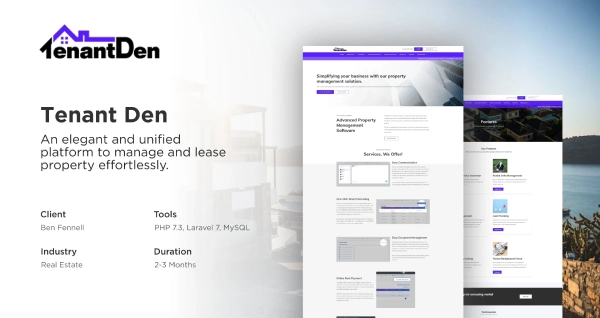



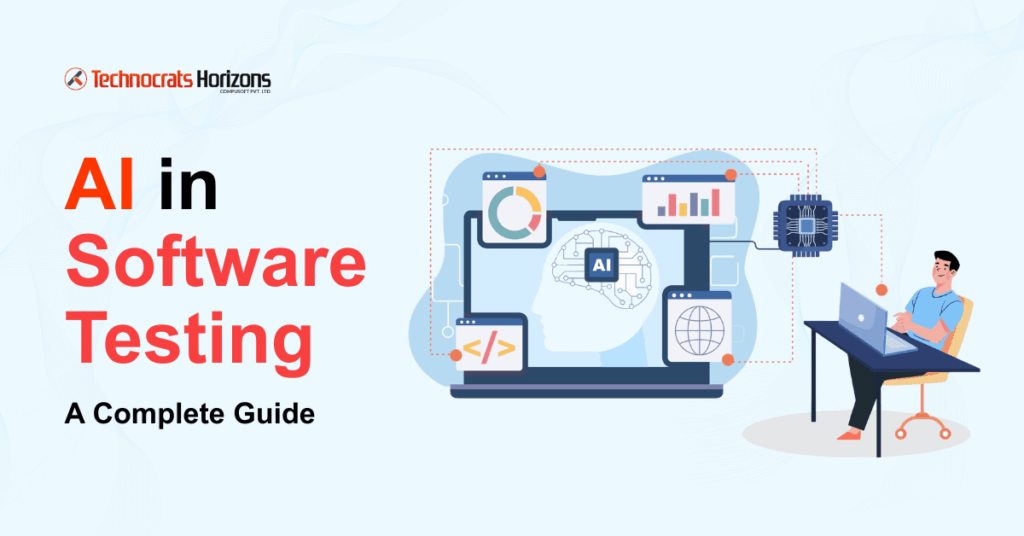


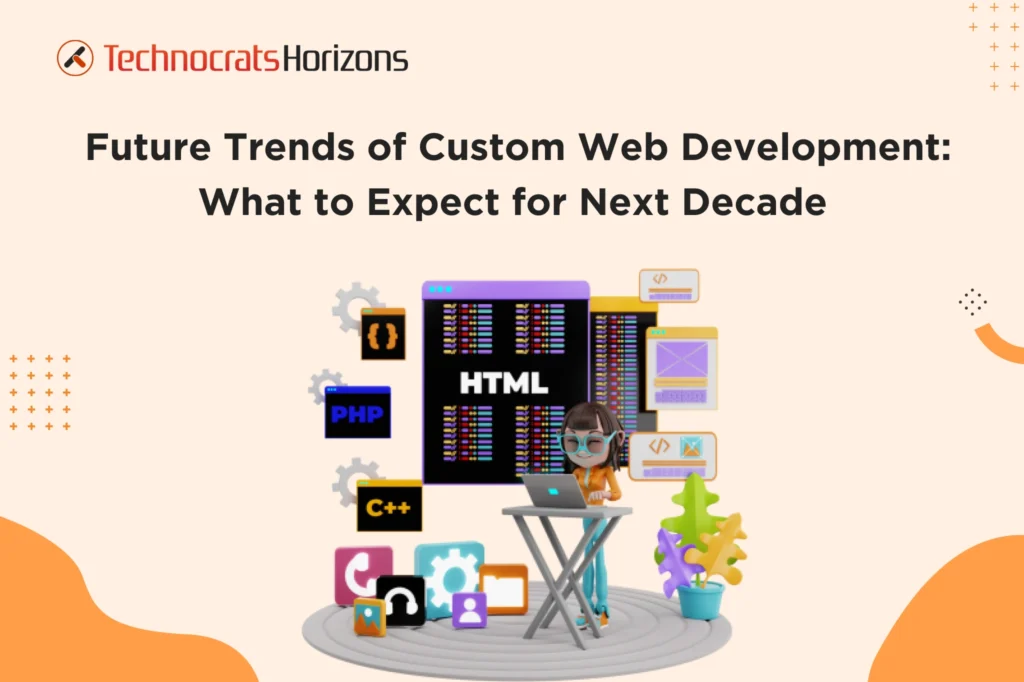

 Request a
Request a













